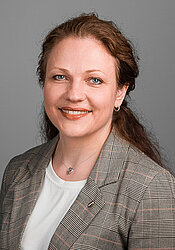Professional master's study programme "Clinical Optometry" (6 semesters)

The video cannot be viewed because you have not selected functional cookies.
To view the video, please enable functional cookies in your cookie settings.
Programme level: Professional Master's
Language of instruction: English
Study form and duration: Full-time - 6 semesters
Credits: 180 ECTS
Obtainable degree or qualification: Professional Master degree in Clinical Optometry
Number of study places for admission in 2026/2027: State-funded study places - 0, study places for tuition fee minimum 5 - 8
Tuition fee per year: 6000 EUR for EU/EEA/Swiss citizens, EU Long-term resident permit holders and their family members. 6000 EUR for citizens of other countries
Study location: Tornakalns
The professional master’s study programme “ Clinical Optometry” offers diversified, wide-ranging studies based on the vision science and contemporary problems of primary vision care. The professional qualification offered upon acquisition of the programme meets the requirements of the professional standard "Optometrist".
Acting Director of the Study Programme
The study program is designed to ensure the growth of the young optometrist as a specialist, acquiring knowledge, skills and competences that meet not only the standard requirements of the optometrist profession, employer requirements and the specifics of the labour market, but also the requirements of the optometrist profession defined in Europe and Category 3 (without the use of medication) requirements defined by the World Optometrists Council in the Global competency-based model of scope of practice in optometry, which provides that the optometrist offers not only optical services (management and dispensing of ophthalmic lenses, ophthalmic frames and other ophthalmic devices that correct defects of the visual system), but also provides primary vision care (evaluation and management of defects of the visual system), including evaluation, differentiation, and management of the health status of the eye structures and related general diseases (including referral to other specialists for diagnosis and treatment). The total amount of the study program – 180 ECTS – is divided into several stages: practice (33%), courses directly related to medicine and optometry (35%), academic and research skills development courses – 32%. The content of the courses is regularly reviewed to ensure a broad knowledge of profession-related issues, emphasizing the latest trends and directions in the rapidly evolving field of vision care.
The study programme (180 ECTS) contains compulsory (part A), optional (part B), free choice part (part C), and practical courses. The syllabus consists of professional (clinical) and scientific (experimental) subjects related to the evaluation, research, and understanding of the human visual system. In the first year, students get basic knowledge, which are necessary for an understanding of vision processes, their evaluation and correction possibilities: optics, general and ocular anatomy, cell biology, microbiology, neurophysiology, general pathology and pharmacology, as well as vision development and ageing. In the following years, the students develop and improve their practical and theoretical knowledge and skills in vision examination and correction, including disorders of binocular vision, contact lens correction, low vision, and ocular diseases. The optional courses allows deeper inside into paediatric optometry, vision training, refractive surgery, and other important fields of vision science.
There is an additional opportunity to gain international study experience and new knowledge in one of the many partner universities during the semester of ERASMUS+ studies.
By fulfilling the requirements of the program, a graduate acquires extensive professional skills and abilities in the field of primary vision care – optometry, as well as academic knowledge, skills and competences in vision science, in order to be able to independently develop research at optometrist's workplace or to continue studies in the doctoral programme in Latvia or abroad.
- Previous education:
- First or second cycle higher education in another healthcare field or first cycle higher education in life sciences, chemistry or physics, medical engineering; - English language proficiency;
*Latvian nationals are required to demonstrate English language proficiency. This may be confirmed through internationally recognised English language test results, other evidence of English proficiency at a minimum of B2 level, or a grade in English on a previous educational certificate (the grade must be no lower than 6 on a 10-point scale), except where previous education was obtained in English. - Passed entrance examination
*Foreign applicants whose previous education was completed outside the European Union (EU), European Economic Area (EEA), or the Swiss Confederation must submit one of the following recognised standardised test results issued within the past five years:
- SAT: minimum score of 1200
- GMAT: minimum score of 595
- GRE: minimum score of 320
If applicants submit SAT and GMAT or GRE results with equivalent scores, and the number of study places is limited, preference will be given to applicants with GMAT or GRE scores.
*Additional admission requirements for non-EU/EEA/Swiss citizens and non-EU long-term residents
The average grade in study courses must be 60% of the maximum;
All grades must be passing (at least 4 in a 10 point grading system);
All non-EU/EEA/Swiss applicants, except University of Latvia graduates, will be required to take part in an online interview as part of the admissions process.
*Information on 10 points grading scale
Admissions open: 1 December 2025 (Foreign applicants)
Admission information:
Email: studies@lu.lv
opto.metodike@lu.lv

 CONFERENCE
CONFERENCE